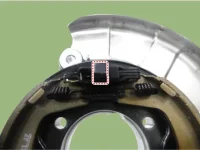ejguillot
Registered Member
- Joined
- Aug 3, 2022
- Messages
- 196
- Reaction score
- 90
- Points
- 28
- Genesis Model Year
- 2019
- Genesis Model Type
- Genesis G70

Hey, could you please elaborate on that? I have 2 questions. First, were you able to push the piston in without any issues? If yes, what happened when you first applied the parking brake? I think the tool resets it so it's barely away from the pads, so when EPB is applied, it clamps the rotors. If you didn't use the tool, the electric motor might turn it, but since pads were retracted, they'd never clamp the rotors. Or maybe the system is smart enough to not stop rotating until it feels the required clamping force, meaning the EPB would 'whirr' for a second or two initially, until it clamps the rotors. So what is it? Just curious, to make sure there's nothing required there, since it's supposed to be necessary, according to the service manual somebody posted once (which is not always correct). Thank you.No “service mode” was required for the brake pad swap and rotor dismount. All I had to do was make sure the parking brake was off before turning the car off.
That has never been the case. The only action you can take during bleeding is to activate the ABS pump's piston, which is not necessary unless you have air in the system, and/or you had contaminated fluid, for not bleeding it regularly. That's why I like to do it regularlyFrom what I remember, you need to put the vehicle in a special mode via a tool before bleeding.
On the G70, apparently the lower trims were supposed to have a foot pedal parking brake option (like the Stinger, and as seen in my 2019 G70 owner's manual). Accordingly, the parking brake is the miniature drum brake in the rear disc rotor setup, as seen in this (from http://www.kstinger.com/electric_parking_brake_epb_-614.html ) pic:Hey, could you please elaborate on that? I have 2 questions. First, were you able to push the piston in without any issues? If yes, what happened when you first applied the parking brake? I think the tool resets it so it's barely away from the pads, so when EPB is applied, it clamps the rotors. If you didn't use the tool, the electric motor might turn it, but since pads were retracted, they'd never clamp the rotors. Or maybe the system is smart enough to not stop rotating until it feels the required clamping force, meaning the EPB would 'whirr' for a second or two initially, until it clamps the rotors. So what is it? Just curious, to make sure there's nothing required there, since it's supposed to be necessary, according to the service manual somebody posted once (which is not always correct). Thank you.
That has never been the case. The only action you can take during bleeding is to activate the ABS pump's piston, which is not necessary unless you have air in the system, and/or you had contaminated fluid, for not bleeding it regularly. That's why I like to do it regularly.

That was awesome help; thank you very much. I think the manual G70s were the only ones with a manual parking brake, but that explains the ancient 'drum-in-disc' setup. And yes, even though it's weaker, I MUCH prefer that setup, since it doesn't affect the rear calipers at all. Most of us would never need to remove the rotor, so it's like the vehicle didn't have EPB. Thanks again for providing that link. And yes, to push calipers in, you just have to rotate the caliper both ways (sideways) before removing; no need for any screwdrivers or such... unless something is blocking such movement. But it's not a big deal either way. No wonder it sounded so weird, quick... and weak. Ha ha.Accordingly, the parking brake is the miniature drum brake in the rear disc rotor setup
Rotate the caliper? Can you elaborate? (I've seen setups where you have to screw the pistons in to retract them. That wasn't the case with the Brembo calipers.That was awesome help; thank you very much. I think the manual G70s were the only ones with a manual parking brake, but that explains the ancient 'drum-in-disc' setup. And yes, even though it's weaker, I MUCH prefer that setup, since it doesn't affect the rear calipers at all. Most of us would never need to remove the rotor, so it's like the vehicle didn't have EPB. Thanks again for providing that link. And yes, to push calipers in, you just have to rotate the caliper both ways (sideways) before removing; no need for any screwdrivers or such... unless something is blocking such movement. But it's not a big deal either way. No wonder it sounded so weird, quick... and weak. Ha ha.
Nice! I look forward to reading your "review".EBC Blue stuff finally arrived.
View attachment 48292
I have the same issue. They did the same thing for me. Replaced disks and it’s still shaking. Reading the forums now to see what brakes n disks to get next. I’d like drilled rotors n pads. We’ll see what I find.Hiya from a fellow Canuck. Do you have some part #/equivalent G-Loc or Hawk or other top tier AFTMKT brand/more precise infos for me in terms of findings and installing these fabled "euro sport pads" on my G70 3.3T Sport 2019, please? My Laval QC dealership put four brand new rotors at 24,000km to fix the jiddering, and now at 40,700km, the jidder has re-appeared in the brake pedal, and I don't trust the Genesis/Hyundai brake parts anymore. I'd like to attack the problem with x8 new quality pads (those have never been changed during the four services on my G70), and monitor the rotors thereafter with my independent mechanic. Thank you sir.

